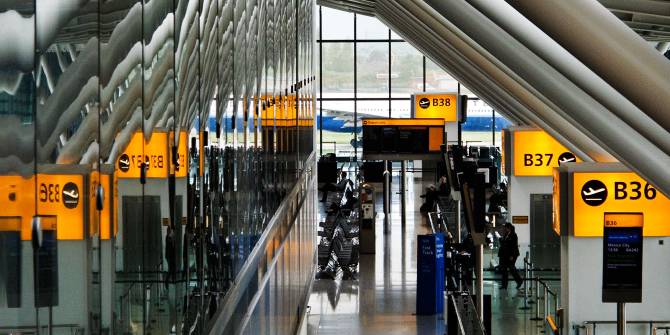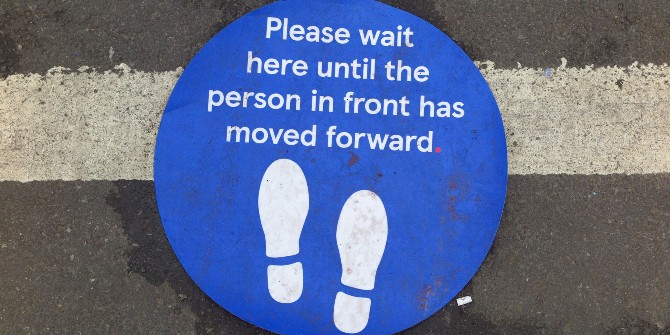Ralf Martin and John Van Reenen (LSE) explain how a carbon tax could both help pay for the enormous costs of the pandemic and encourage ‘clean’ investment. Crucially, it should be levied in a few years’ time, when the UK economy has begun to recover.
Life on earth has changed fundamentally over the last three months. While in the short run the immediate response to the COVID-19 crisis is paramount, many have started to ask about the impact of the pandemic on the looming climate emergency.

Optimists hoped that the shock of the pandemic coupled with the experience of lockdown translates into a new momentum for the transition to a clean economy. Attitudes towards scientific advice might have changed, new – less pollution intensive – ways of working remotely might have been learned. Governments might embark on stimulus spending with a strong emphasis on investments in clean infrastructure and innovation.
However, our big concern is that, despite good intentions, governments and business will be severely constrained in their spending once the immediate crisis is over, due to the extraordinary financial burden of the lockdown. Hence, far from an increase, this could lead to reductions in investments needed for the transition to a clean net zero carbon economy. In this situation, a moderate carbon tax (of say £50/€56 per tonne of CO2, as proposed by the Grantham Institute) announced now, but imposed only at some point well into the recovery period (say around 2025) could solve several problems simultaneously.
First, it would help governments to bolster the public finances. For example, the UK government put together a package of around £400 billion to help the COVID-19-stricken economy. If the UK reaches its net zero carbon goal by 2050 the total remaining revenue from a £50 carbon tax starting in 2025 would amount to something on the order of £150 billion, recovering a large chunk of the government’s COVID-19 spending.
Secondly, it will send the right signals to businesses and households to invest in reducing carbon emissions. It will also safeguard against the potential threat to ‘clean’ investments due the low cost of fossil fuels in response to the COVID-19 fallout (i.e. negative oil prices). At same time, it will not have cash flow implications for businesses struggling with the fallout from the crisis, as no actual tax will be levied immediately.
Thirdly, it will help promote growth. In our research, we have identified that carbon and fuel price increases spur clean innovation and deter dirty innovation with a net positive impact. Furthermore, we have evidence that clean innovation also raises productivity elsewhere in the economy. Moreover, some of the revenues raised by the tax can be used to subsidise green technologies. Since innovation is the key driver of sustained economic growth, a carbon tax is therefore likely to lead to more economic growth, which is exactly what is needed to recover post-lockdown.
Fourthly, while the efficiency-improving elements of a carbon tax or other forms of carbon pricing have long been stressed by economists, political opposition has hampered their widespread adoption. However, if done carefully, the post pandemic economic and political landscape might prove an opportune environment for carbon pricing. People realise that the crisis spending must be recouped in the long run, so some revenue raising will be inevitable. In this case, why not do it in a way that helps tackle the climate crisis?
Success will in part depend on how fairly the carbon tax is implemented as well as how it is communicated. For fairness, we must address the distributional impact of carbon pricing to avoid the poor being hit harder than the rich. This can be accomplished by paying back some of the revenue in the form of an allowance to lower-income households. This provides also an opportunity for making a carbon tax popular – as the recent experience of British Columbia seems to indicate.
Our efforts must also be sensitive to existing carbon-pricing schemes. Even though in terms of impact on the climate it does not matter how a given unit of a greenhouse gas is emitted, existing regulations treat different emitters (and even different emissions from the same emitter) vastly differently. This makes carbon regulation inefficient and therefore more expensive than it needs to be. A COVID-19-related general increase in carbon pricing could be used to rectify some of these differences.
To successfully implement this policy in the future will need a cross-party consensus. This is feasible in the UK as the Conservatives have recently committed to the net zero carbon target by 2050 and Labour has been championing climate change action over recent decades.
Is paying down the government’s COVID-19 debt the best use for the carbon tax revenue? We think so, as this could be part of a new “Marshall Plan for Growth” after the pandemic, one that is tilted towards the green transition. By providing an additional form of tax revenue, this opens fiscal space for governments to rise to the challenge of rebuilding our shattered economy.
This post represents the views of the authors and not those of the COVID-19 blog, nor LSE.






This post seems to be one that very fundamentally ignores what is actually happening with Covid 19 across the planet. The people in power are not thinking about environmental issues, they are thinking about the numbers of people dying and the continued threat to lives and economies. To reduce this to an environmental issue (other than the virus itself) is opportunist and appears naïve.
Recovery will come first (one hopes) with protection of lives, and then second, with consideration of all those who have lost their jobs, incomes, and businesses. Perhaps recovery could find some businesses that will push environmental issues, but that is hardly likely to be major concern of governments having spent billions of £s trying to keep the economy afloat and prevent another flair up of the virus.
This comment seems to mis-understands the main point of our post: it is precisely because we fear that governments will not devote enough attention to climate change or simply won’t have the resources for it why it is important to think about a carbon tax. It will help governments in the recovery period to generate much needed revenue and it should stimulate growth, which is what everybody will want even those that don’t care about climate change.
But it also will set us on the right path to avoid the potentially more dramatic crisis from climate change down the line.
Do you feel if there is a carbon tax that is issued, (which I personally believe is an important step towards combating the climate change effects 10 years later), consumers would be open to switching to solar charged battery electric vehicles?